 Photo From pixabay
Photo From pixabayOriginally Posted On: https://djplayit.com/how-to-dj/
If you want to learn how to DJ, you have picked a great time to learn how to become a DJ and make money. Since we have MIDI DJ controllers and modern DJ software that simplifies much of the process of DJing, anybody with enough ambition and persistence can make it in the industry as a DJ.
In this guide, we will do our best to cover much of the necessary information you need to learn how to become a professional DJ.
Anybody who wants to learn the basics of the industry, you will definitely want to read on. Some of the most important trade secrets and DJ tips relevant for both beginners and intermediate alike DJs are described here.
How Can I Be a DJ? Choose What Type of DJ You Want to Be:You may want to be a DJ, but you need to know what type of DJ that you want to be. In order to explain how to DJ, we need to break this broad topic down into some narrow categories.
Mobile DJ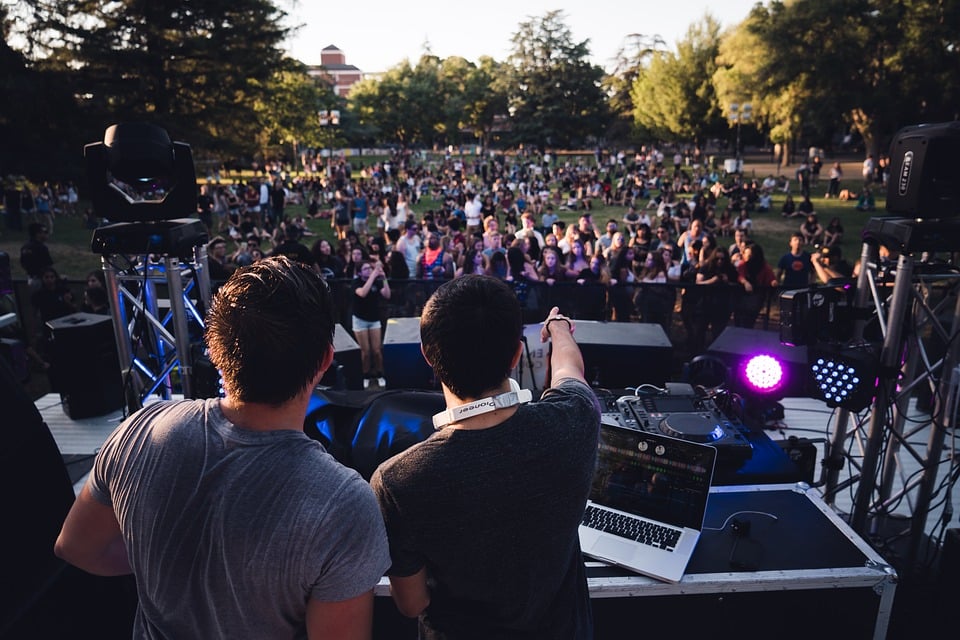
A mobile DJ is the one that serves local clients. They will typically own their entire setup, and have the means to easily transport everything across town to perform for a local event. A mobile DJ receives most of their work during holidays and special events.
Mobile DJs might work for various companies before they eventually realize that they are best off finding clients on their own. Word of mouth advertising is one of the best ways to generate plenty of gigs as a mobile DJ.
Mobile DJs are well-versed in any sort of private amateur event that involves loud music and alcohol. Many people who want to establish themselves in the industry as a professional DJ will start out as a mobile DJ.
Bar DJ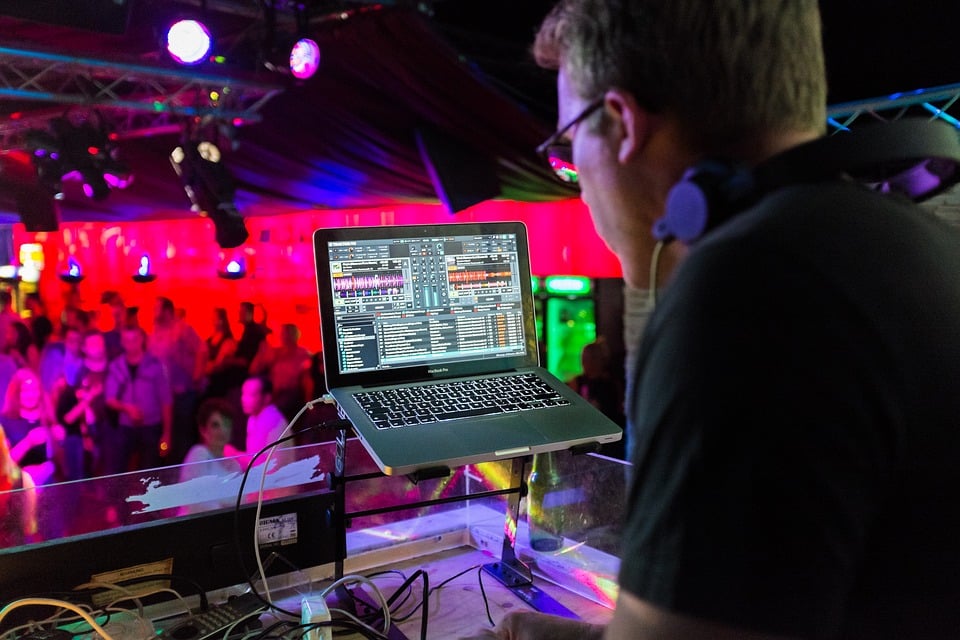
A bar DJ is somebody who either specializes in performing at bars, or holds a permanent resident position. Performing as a bar DJ is considerably stressful for somebody who isn’t familiar with the culture of the venue, or somebody who doesn’t have a lot of experience. Bars are not a place where you will be able to easily read the crowd and play the proper music as a beginner.
Bar DJs are expected to provide a dancing atmosphere, relaxing atmosphere, and one which is somewhere in between, depending on the time and type of bar that they work at. They may even be to run karaoke, facilitate contests, be the MC for special events, and anything else which is specific to the bar.
For these reasons, a bar DJ is somebody who normally has a considerable amount of experience in the industry. In most cases, a beginner DJ will not be able to secure a position as a bar DJ right away.
Club DJ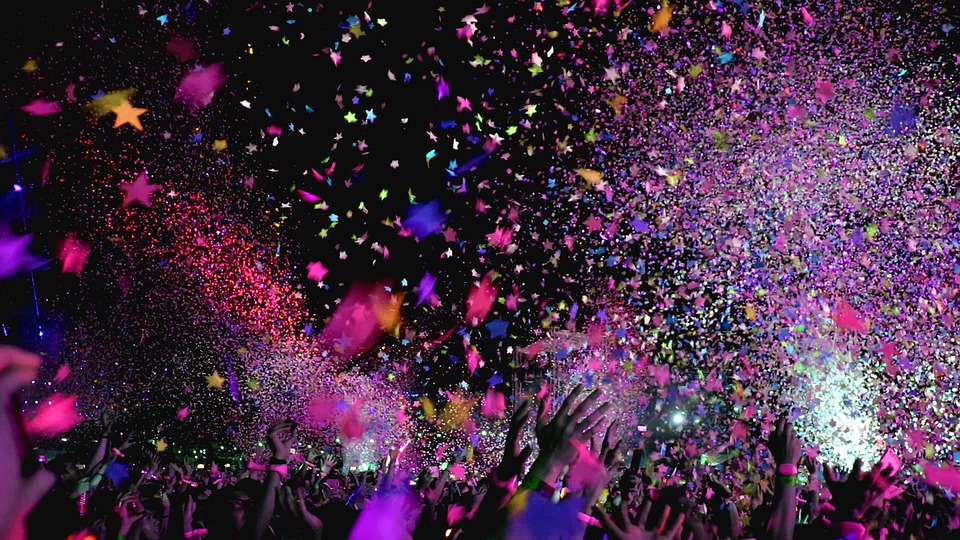
A club DJ is the type of DJ that many aspiring DJs hope to be from the get-go. Club DJs work at your local night club on the weekends doing everything that they can to keep the party going.
This usually implies that you have top-notch mixing skills, a professional library, talent as an MC on the microphone, and years of experience.
Typically, clients and venues who hire a club DJ will solely look for those with plenty of background experience and clear talent.
Usually, a DJ who holds a resident position at a prestigious club will share the stage with many other acts and DJs. When the famous DJ comes to perform at your venue, you will probably have the night off.
Although the pay of a club can be significant, it is usually more reflective of the fact that you use the venue’s equipment and have a more permanent position.
Although this is one of most desired and glamorous positions, it isn’t necessarily the most profitable job for a DJ.
Radio DJ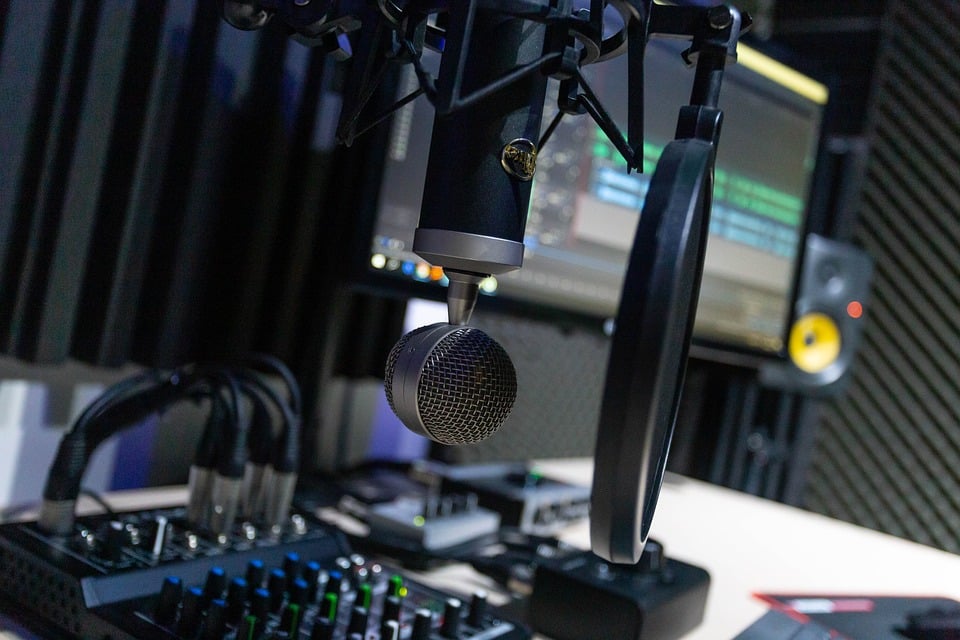
Radio DJs have a job which is very different than the average entrepreneur who starts their own DJ business. These people will typically go to college and receive a degree in a field like broadcasting or communications. Simultaneously, they may also have a background in the music industry working as a DJ or something similar.
A radio DJ is not typically expected to excel at their mixing skills, transitioning skills, or even scratching. Although skills like this may be preferable to certain employers, a typical radio DJ will simply need to be good at song selection and have a nice voice on the microphone.
Anybody who chooses to become a radio DJ has the immediate benefit of a secure position, plenty of hours, the ability to work with like-minded people.
Radio DJs are also much more likely to receive employment benefits like insurance, retirement plans, paid vacation, and other benefits which can come with working a corporate position for a reputable employer.
Wedding DJ
Those who choose to specialize as a wedding DJ may not have access to the most glamorous and fun events, but will have the ability to make some good income.
Although a beginner DJ can theoretically start working as a wedding DJ right away, they may not be able to charge the premium rates that those with more experience and better equipment can.
A wedding DJ almost always owns all their own equipment, and has access to premium add-ons like dancefloor lighting, fog, photo booths, subwoofers, and so on. A wedding DJ will typically arrive to work in a tuxedo, a professional mindset, a detailed plan of events, a playlist of requests.
At the end of a successful wedding, you should leave your crowd on the dance floor asking for one more song, a check with a nice tip included, a free meal, and maybe even a new friend or two.
However, working as a wedding DJ can be considerably difficult. From things like dealing with clients who have unreasonable expectations, handling requests which you know will kill the party, and being expected to bring life to the party.
If you are not confident on the microphone, not able to start a dance party with people who would likely otherwise stay in their chairs, or good with people, this will not be a great place to start.
If you haven’t figured it out yet, a wedding DJ is somebody who can really make a lot of money quickly. However, the reality is that you will only be doing one or two weddings a week. Most weddings take place during the Spring and Summer.
Concert Venue DJ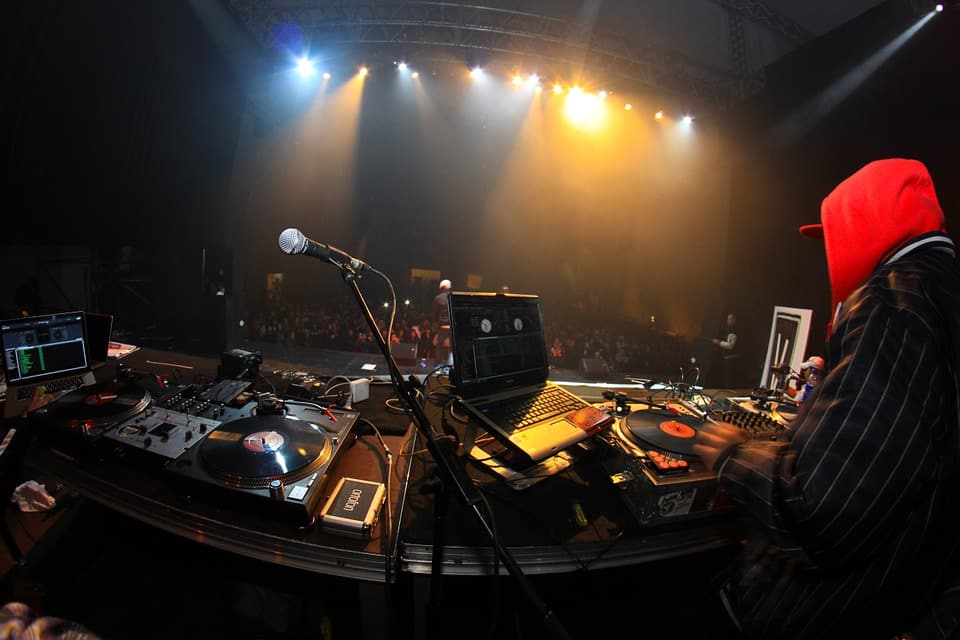
A concert venue DJ might hold a residency with a venue. Various live acts that tour around the country look to the venue in order to provide a DJ for their sounds. Additionally, a concert venue DJ may be hired by a famous act directly, and travel with them.
Concert venue DJs are great at complementing live acts with cuts, scratches, and sound FX. If you want to be a concert venue DJ, you probably won’t start off making that much money. You will get a lot of respect from your community and peers, though, for your skills on the turntable.
Any sort of DJ in the business respects these sorts of DJs. Perhaps even much more than any famous producer DJ. The mark of a concert venue DJ who is at the top of their game is that they are exceptionally good at scratching.
Scratching is one of the most difficult and rare skill sets of a DJ. To be a concert venue DJ, it is necessary. When it is done well, it can make you more valuable in the industry than many of your competitors.
Producer DJ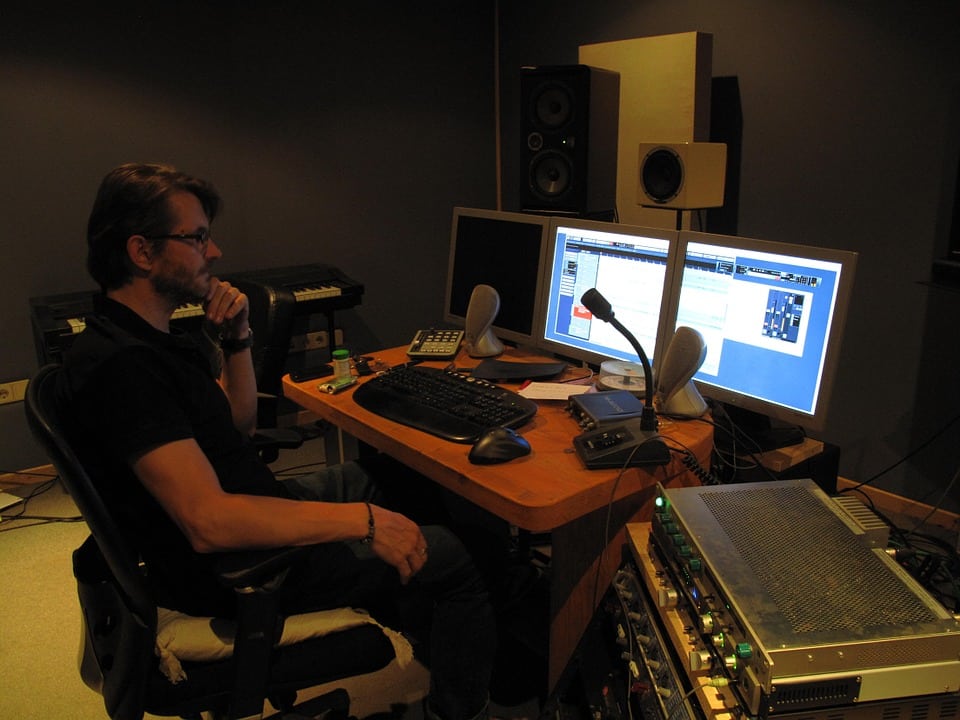
A producer DJ is somebody who both makes their own tracks, and plays their tracks at their live events. Although a producer DJ may also work as one of the other types of DJs, they stand out as the ones who perform original music.
A producer DJ will normally hustle for years and years making their own music and marketing themselves. They might work as a mobile DJ on the side, or simply stick in their bedroom making tracks.
Many might even balance as a producer DJ and club DJ, for example, to produce transition-friendly tracks in their home studio. Tracks like this are often features on DJ record pools.
When famous, a producer DJ can make some serious money.
Chose the Type of Setup that you WantWith many different types of products on the market to help you learn how to DJ, it’s important that you also know what kind of setup that you want to have.
There are three types of setups that a professional DJ can have. A digital setup, hybrid setup, or a standalone setup. Let’s break down each
Digital Setup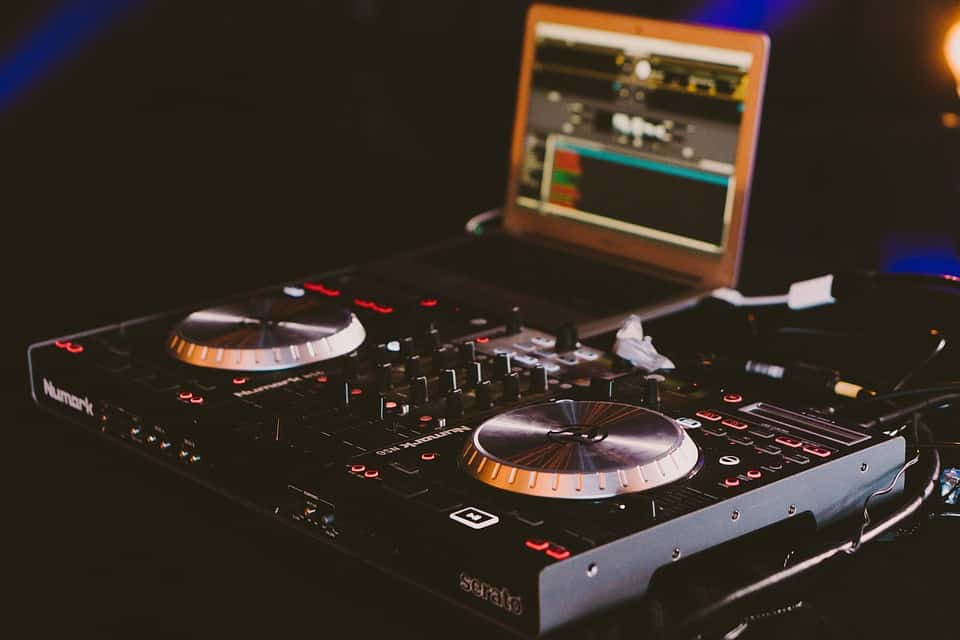
If you have a digital setup, your gear will need a laptop and software in order to function. This also means that you will be able to use all of the mp3 files in your library for your live sets without moving the files over to USBs or CDs in advance.
The main issue with digital setups is that they are naturally more prone to technical issues. After all, computers don’t work perfectly 100% of the time. Errors and problems will be inevitable.
Digital setups also require an individual with some technical knowledge to be able to install controllers, map the MIDI buttons, and deal with technical issues. With enough research and commitment, though, they can perform as well as any other type of DJ set up.
Standalone Setup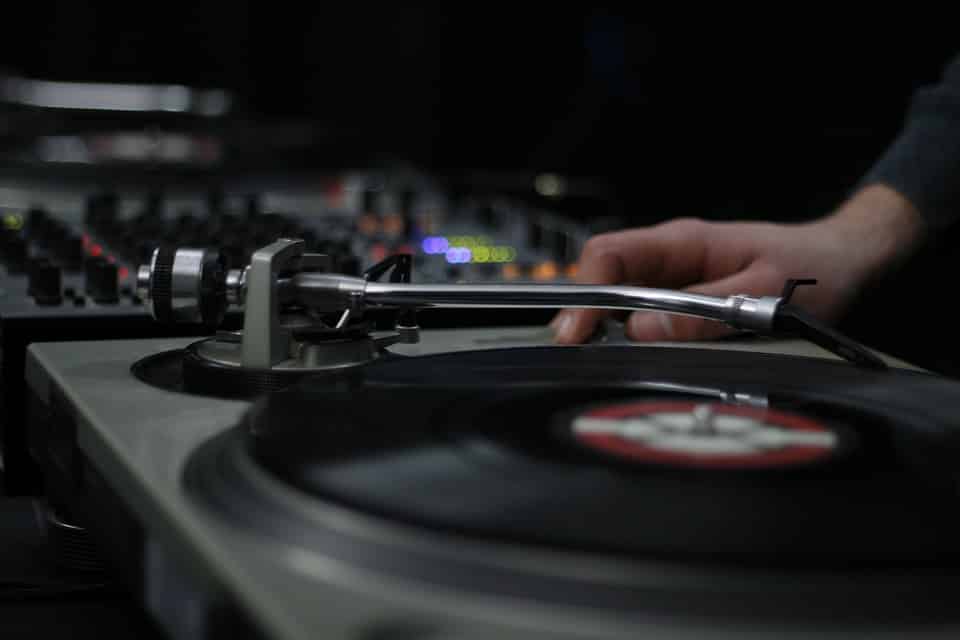
When you think of your favorite old-school DJ, think of a standalone setup. Although this may include vinyl turntables, it may also include CDJs.
The main difference between a standalone setup and a digital setup is that standalone setups run without the assistance of software. This means that those who use standalone setups don’t need to worry about things like a laptop, audio interface, and so on.
DJs who use standalone set ups prefer them since the lack of software and laptop eliminates one more variable that may cause a technical difficulty. As we all know, computers can fail. If you want to avoid using computers at all costs, get standalone gear.
Hybrid Setup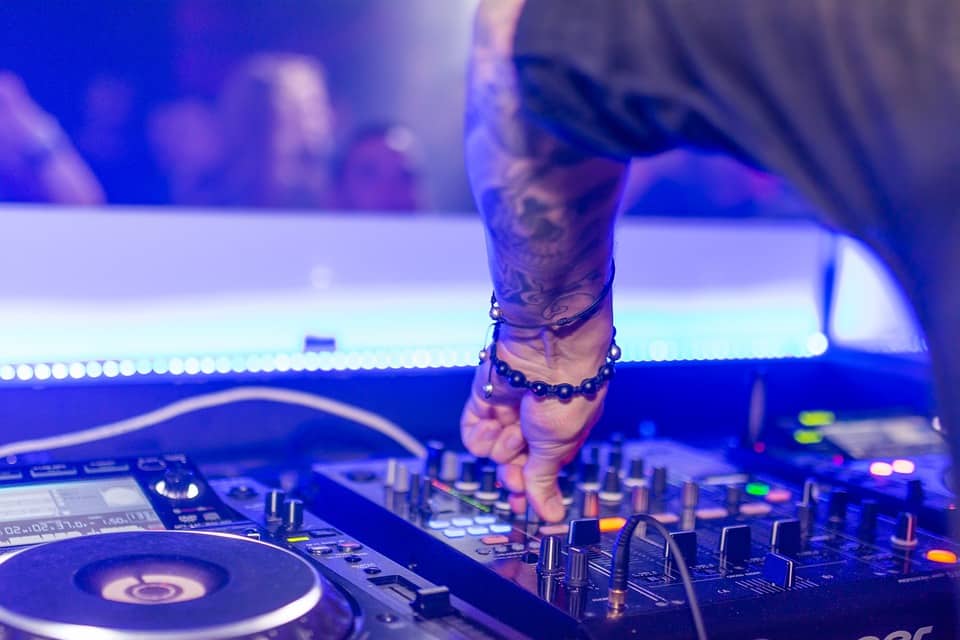
A hybrid DJ setup is exactly what it sounds like. It incorporates the best technology from both digital setups and standalone setups in order to allow the DJ to use the features that they like the most in each of these.
An example of a hybrid setup is using a MIDI-powered mixer on your software, and then having two timecode-powered vinyl turntables which allow you to scratch digital files with otherwise standalone gear.
Another example of a hybrid setup is a DJ who has a MIDI which can function as a standalone device. This sort of setup allows you to play tracks both with your laptop and without your laptop. When you don’t have your laptop, simply plug in your USB drive and speakers to start jamming.
A final example of a hybrid setup is somebody that uses a standalone mixer alongside MIDI CDJ controllers. Although the mixer doesn’t function as a MIDI device, it can still easily be hooked up to software and the MIDI controllers through the audio interface.
Common Trade Secrets, Techniques & DJ TipsIf you want to learn how to DJ and start making money, then there are many different trade secrets and tips that you will come across.
Beatmatching
Beatmatching is one of the most basic, yet necessary skills of a DJ. To describe this simply, beatmatching is the process of matching the tempo of two songs so that they can play at the same time on beat.
The luxury of the modern era is that DJ software can automatically calculate the BPM of your entire music library. The calculations of DJ software are also much more precise than humans are capable of doing on their own.
To beatmatch two songs, all that you need to do is press the sync button on your DJ controller or software. Then, the two songs will instantly have the same tempo. You can also use the tempo fader on your controller or activate slip mode in order to fine tune the tempo of a track.
Transitioning
If you are confident in your ability to beatmatch, you should will then be ready to start working on some basic transition techniques. Transitioning is the process in which a DJ skillfully moves from one track to the next without cutting the music.
As you will learn, there are endless ways to transition tracks. However, the most classic type of transition is done where you beatmatch two different tracks to the same tempo. Once you have two tracks at the same tempo, you need to then pick the right time to press play on the next track and move the crossfader away from your previous track.
A typical dance song will be set in a 4/4-time signature. In your head, you should be able to listen to the song and count “1, 2, 3 4, 1, 2, 3, 4…” in your head on par with the rhythm of the song’s time signature. Typically, the right time to press play and begin your transition is when you count “1” and begin a new measure.
Song Selection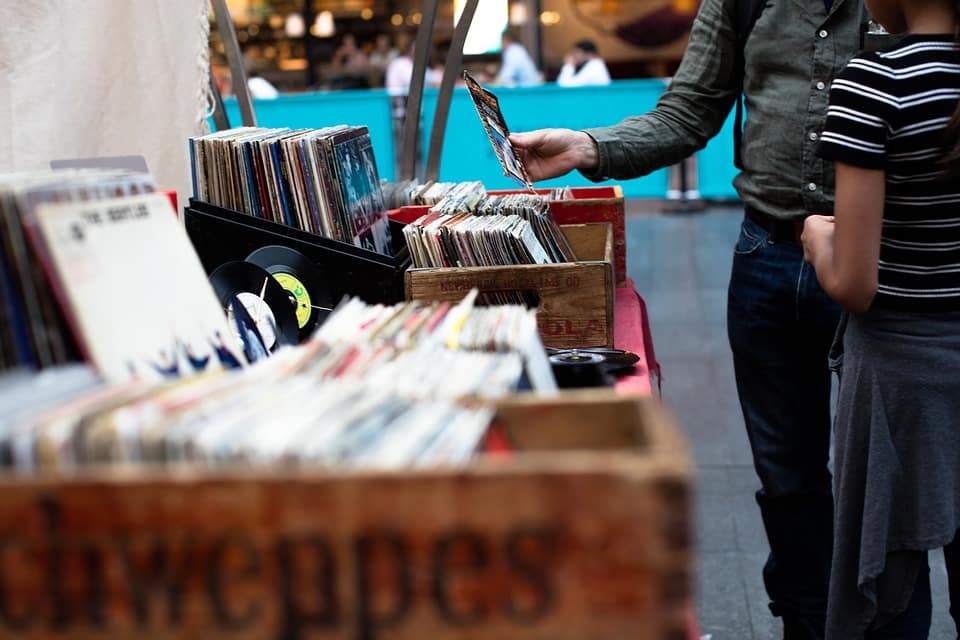
Another one of the most important aspects of your job as a professional DJ is being to effectively select songs. As easy as something like this may be when you are sitting by yourself at home, playing for a crowd is a little more complicated.
Professional Djs are expected to play the best song possible each time. As you start to develop your skills and perform at more gigs, you will continue to get better and better at song selection.
DJ Controllers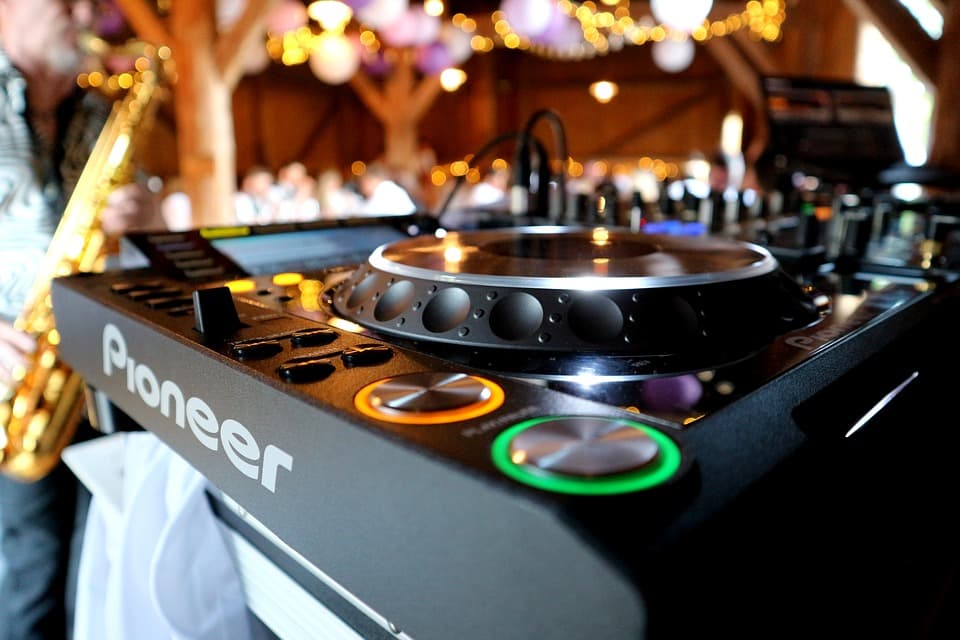
If a CDJ and mixer setup provides you with the most professional look and capabilities for your setup, then DJ controllers leave with the most portable and lightweight option which can still provide just about all the features that you need.
For this reason, many professional DJs with several years in the industry decided to stick with small DJ controllers over a much larger and expensive setup.
Those who choose to use DJ controllers will still be able to access all the features from their favorite DJ software. Since they are becoming increasingly more and more like a classic vinyl turntable setup in terms of scratching, while excelling at other tasks, they have started to become a lot more popular.
Speakers
Any sort of PA speakers that you will encounter will either be powered or passive. Both of these speakers have their set of benefits and setbacks. For this reason, it’s important that you understand what makes them different from each other.
In short, most DJs will prefer to use powered speakers since they don’t require an amplifier, but won’t be able to afford the ones that they truly need. For this reason, many will instead choose to use passive speakers. Those who purchase passive speakers also need to purchase amplifiers to power them.
Software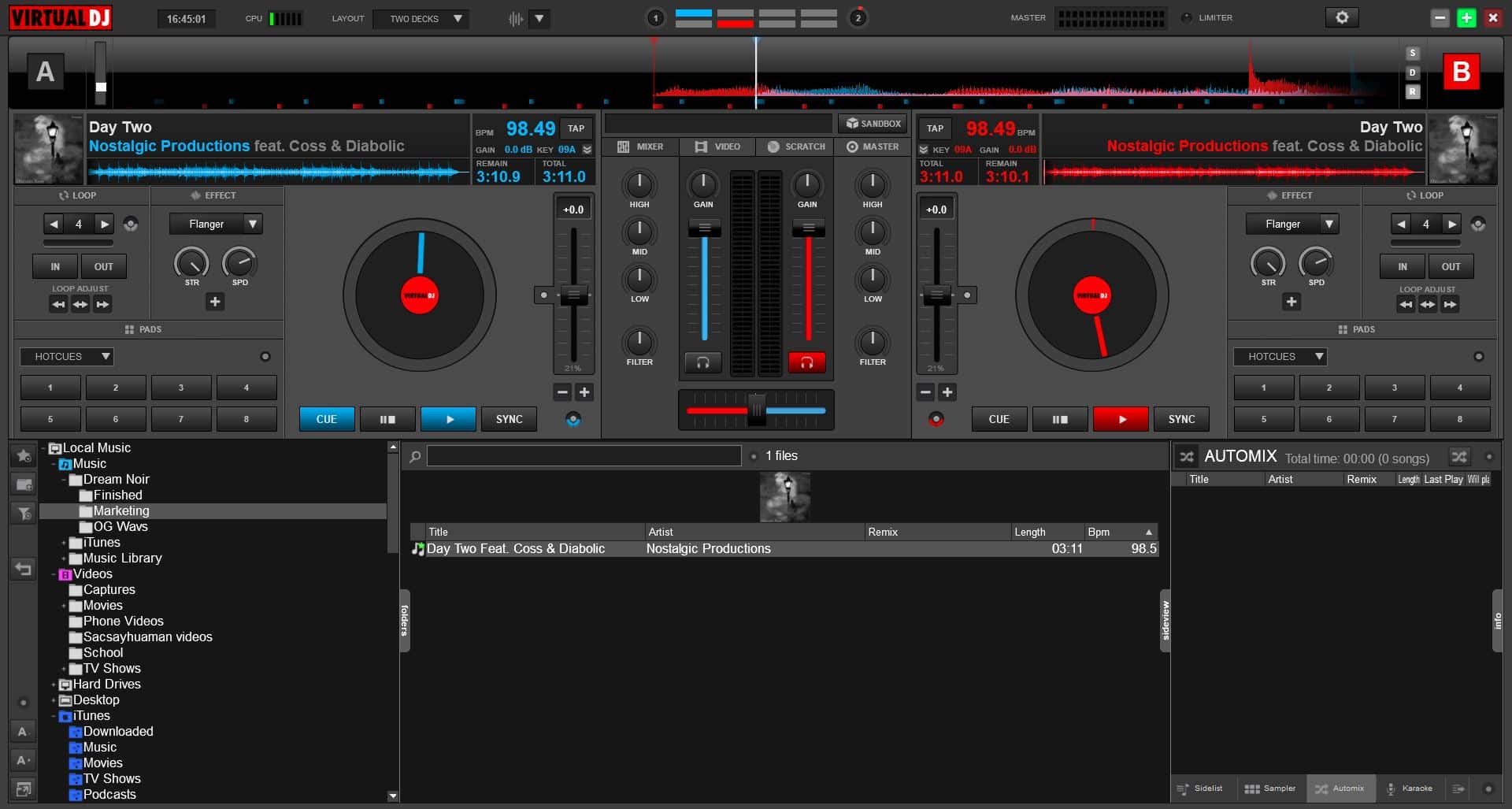
If you want to have a digital setup and use a DJ controller as part of your set up, then you will need to pick which software that you want to use. Some of the most popular DJ software choices to consider are Traktor Pro, Virtual DJ, Serato, and Rekordbox.
Depending on what type of controller you purchase, your audio interface, and the features that you want, you may decide to settle with any of these software options. Or, a completely different option which best serves your needs.
Audio Interface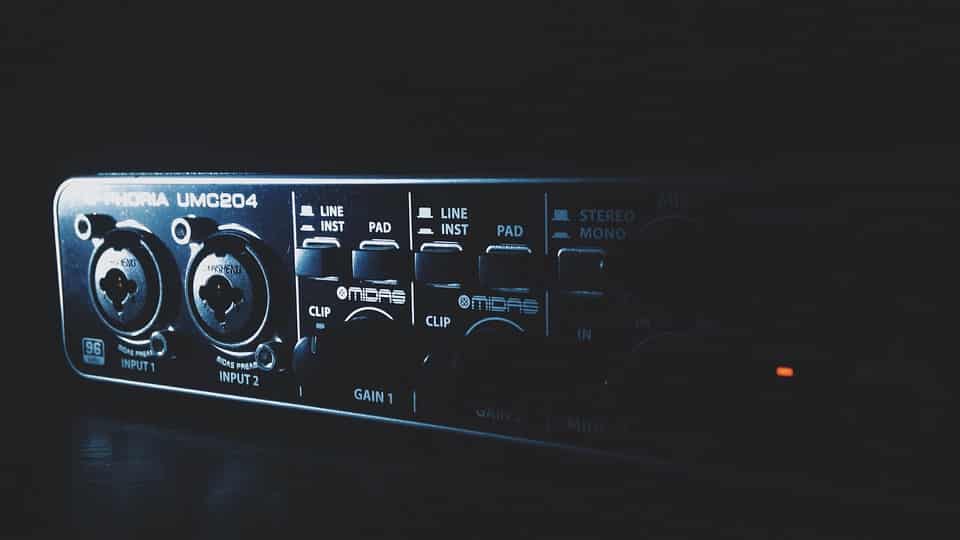
A high-quality audio interface is one of the most important parts of a high-quality professional DJ setup. This is the tool which you use to connect all your audio to your computer. It also plays a role in how good your mixes sound over the PA speakers.
Sometimes referred to as a sound card, these devices will connect straight to your amplifier and laptop. They can also typically connect to other things like microphones, instruments, and even mp3 devices.
Accessories, Cords, & Adapters
Accessories cords and adapters are one of the most underappreciated aspects that you need to master in order to become a DJ and make money. This can include things like RCA to quarter-inch adapters, XLR to quarter-inch adapters, headphones adapters, and so on.
You will also need to purchase various cords in order to get your set up working properly from the get-go. Depending on the type of setup that you have, this may include XLR cables, RCA cables, or quarter-inch speaker cables.
Finally, there are many different accessories which you will find yourself needing to purchase at some point. This includes products such as headphones, speakers stands, dance floor lighting, and various other products which are dependent which type of DJ you are and what type of set up you have.
Learning How to DJ, Practicing Your Skills, & Finding Your First GigAs with any sort of job, there is a training process involved with becoming a DJ. Although many DJs have been blessed in the past to know somebody else who can train them how to mix tracks like a pro, the rest of us have to learn all the ropes on our own. The same could be said when it comes time to find your own clients.
Learn, Practice, Learn, & Practice Some More
One of the biggest points to stress when it comes to practicing your craft as a DJ is that you will always have a new technique to learn and master.
Once you learn how to beat match and transition between songs of a similar BPM, then you will need to learn how to transition between songs that have completely different BPMs.
Then, you will need to learn how to select songs which have similar keys. The list goes on, and we have only mentioned some basic skills.
Embrace the need for practice and continual development. This is much better than assuming you are the best, only to learn that you have much to learn after a terrible failure while at one of your gigs.
Market Yourself & Find Your First Gig
When you are in the initial stages of building your DJ business, any sort of gig and experience will be relevant. Marketing yourself in order to find that first gig to get your feet wet will finally give you the assurance that you can make a career out of this.
Typically, the best way to get your first gig is to place advertisements. There are many different local platforms which best serve your target audience.
When you place your first advertisements, make it clear that you are a beginner in the industry. Make it clear what type of equipment you have.
Most importantly, offer the do your first gig at a very low cost in order to get the experience and positive review. As your experience and level of skill grows, so will your paychecks.
First Gain Experience Then Find Higher Paying Work
Once you start doing gigs, you will inevitably run into problems. You will fail. You will forget things, you will disappoint people, your equipment will fail, you will fail to ask for certain pieces of information, and so on and so forth.
If you understand that problems will come, you will be much more prepared to handle them than the DJ who believes that they are perfect and have a perfect service.
Accordingly, there are a few years or so of time that you will need to put in order to have the skill level necessary to find higher paying work and gigs.
FAQs & Free DJ TipsNow that we have covered some of the basic information involved in learning how to DJ, let’s go ahead and explore some of the most common DJ tips and FAQs that you should keep in mind while learning how to become a DJ and make money in this industry.
Where Do DJs Get Their Music?DJs usually get their music from a trustworthy vendor of high-quality music. Typically, a DJ will get purchase each of their tracks individually, subscribe to a streaming service, or download from a DJ record pool.
When you go out to a nightclub or similar event where there is a professional DJ performing, there will be many instances where a beginner DJ will be left in awe of their talent. However, it’s important that much of the magic a beginner will find in many club DJs isn’t actually that complicated to do themselves.
Professional club DJs typically use mixes taken from an online DJ record pool like Barbangerz, DJcity, and so on. Websites like this allow producer DJs to share their own remixes of tracks, and also include transition-friendly and edited versions of popular tracks.
How Much Does it Cost for a DJ Setup?In order to determine how much it costs for a DJ setup, you need to first decide what type of DJ that you want to be, and what type of set up that you wish to perform on. As a beginner DJ, you probably won’t need to spend that much on your starter set up. Think in terms of $500 – $1,500.
If you want to have a respected professional DJ setup, though, you will definitely need to invest a lot of money. When you factor in items such as lights, sub woofers, and top-of-the-line controllers, you can easily spend more than $5,000 – $10,000 on your setup.
How Do I Start Being a DJ?In order to star being a DJ, you need to first determine what type of DJ that you want to be. The most common types to choose from include mobile DJ, bar DJ, club DJ, radio DJ, wedding DJ, producer DJ, and concert venue DJ.
Once you know what type of DJ that you want to be, you need to invest in DJ equipment so that you can practice your skills and eventually start booking gigs. Every famous DJ that you hear of had to start in this same position.
What Do I Need to DJ?From the start, you won’t need that much gear to DJ. As you start developing your skills, you will probably choose to invest in more expensive gear. Here are the basic components of a starter DJ setup. This is what you need to start a business today.
- Good Starter DJ Speakers.
- Two Speaker Stands.
- A Nice DJ Laptop.
- Power Amplifier (only for passive speakers).
- Beginner DJ controller.
- Premium DJ Software.
- Audio Interface.
- Gig Bag, Cords & Adapters.
- Power Strip & Extension cords.
- DJ Headphones.
Everybody who has made it in the industry of DJing had to start from somewhere. In order to become a good DJ, you need to first know what type of DJ you want to be. You will also need to have your own gear which you can practice on.
In any case, the only way to become a good DJ is to continue practicing new techniques and performing well at your gigs. When failure and accidents happen, make sure to learn from them. Nobody in this industry is perfect. In order to be a good DJ, you simply need to be respected by your peers and competitors.
What Skills Do you Need to Be a DJ?There are countless skills that are involved in becoming a good DJ. Of course, the most basic skills that you need to be a DJ is being able to select the right songs at the perfect moment.
Then, there are technical skills such beatmatching, transitioning, scratching, using EQs and sound FX, and much more. At a bare minimum, you need to have the gear for playing loud music and the knowledge of how to use your equipment in order to make money as a DJ.
What is the Difference Between a DJ and a Turntablist?A DJ is somebody who works in the DJ industry. This can include working at weddings, bars, clubs, school dances, private parties, and so on.
A turntablist is commonly referred to by as as a “concert venue DJ.” Although still a DJ, a turntablist excels at their scratching skills on the turntable. They use either vinyl turntables or timecode vinyls in order to do this.
What Does a Mobile DJ Do?A mobile DJ is a DJ who works either for themselves or for a different company. They will typically work jobs such as weddings, school dances, private parties, and so on. Somebody who is a mobile DJ will usually own all of their own equipment.
Although working at gigs and performing for your clients is one of the most fun aspects of being a mobile DJ, they also spend a lot of time setting up their gear, tearing it down, and transporting themselves (and their gear) to and from each gig.
How Much Does a Club DJ Make?A club DJ can receive a lot of money, a moderate amount, or a glamorous amount. This all depends on who you are, who you are working for, and so on. For example, a resident DJ will typically make a lot less than a famous DJ making a guest appearance at a club.
Typically, the pay range for a professional club DJ is anywhere between $500 – $1,500 per night. Of course, it is possible for a beginner club DJ to make a little less than this on a weekly basis as they continue to build their experience. As a famous DJ, it is normal to make well over $10,000 for each gig at a club.
How Do I Get My First DJ Club Gig?In order to get your first DJ club gig, you will likely need to spend years developing your skills, portfolio, and following. A club will typically not hire a DJ on a permanent basis unless they can confirm their skills and talent.
The best way to get your first DJ club gig is to start off working as a mobile DJ for several years. As you start to develop experience and work entry-level gigs, you will also get the income that you need to invest in high-end gear.
Once you are confident in your skills as a DJ, have all the right gear, and so on, you can then start applying to many different clubs around town. You can do this either by showing up in-person, or by responding to online ads seeking a new DJ. Once you finally secure your first club DJ gig, you will be glad that you put in all the effort.
How Much Does a DJ Cost for 3 Hours?A professional DJ can make either a lot or hardly any money. For a three hour set at a club, a professional DJ can make $500 and up. However, a mobile DJ working a private party may only make around $200.
In other words, a DJ can either be really affordable or expensive to hire. To determine how much a DJ costs for 3 hours, first consider what type of DJ we are talking about. Your local mobile DJ will probably charge you anywhere between $40 – $150 an hour.
How Much Does a Famous DJ Make?Famous DJs are able to make a lot more than a developing DJ with little experience. A popular DJ will make tens of thousands in one night on a typical basis. The reason is simple. They don’t typically work that many gigs. So they make each one they do work at count. Plus, they have a popular name. This only adds value to their service.
DJ Grandmaster Flash, as an example, makes anywhere between $25,000 – $39,999 for USA based gigs. A more modern act such as DJ Afrojack makes between $500,000 – $1,000,000. Although DJ Grandmaster Flash is a pioneer and well repected in the DJ industry, it that recent famous DJs make a little more.
What Do DJs Use to Mix?In order to mix, a DJ can use a variety of different equipment. A DJ who uses a standalone system will use something like two CDJs and a mixer. Or a standalone system can be used with two vinyl turntables and a mixer. Typically, DJs will take advantage of the modern digital equipment. Modern equipment usually consists of MIDI DJ controllers, alongside DJ software.

